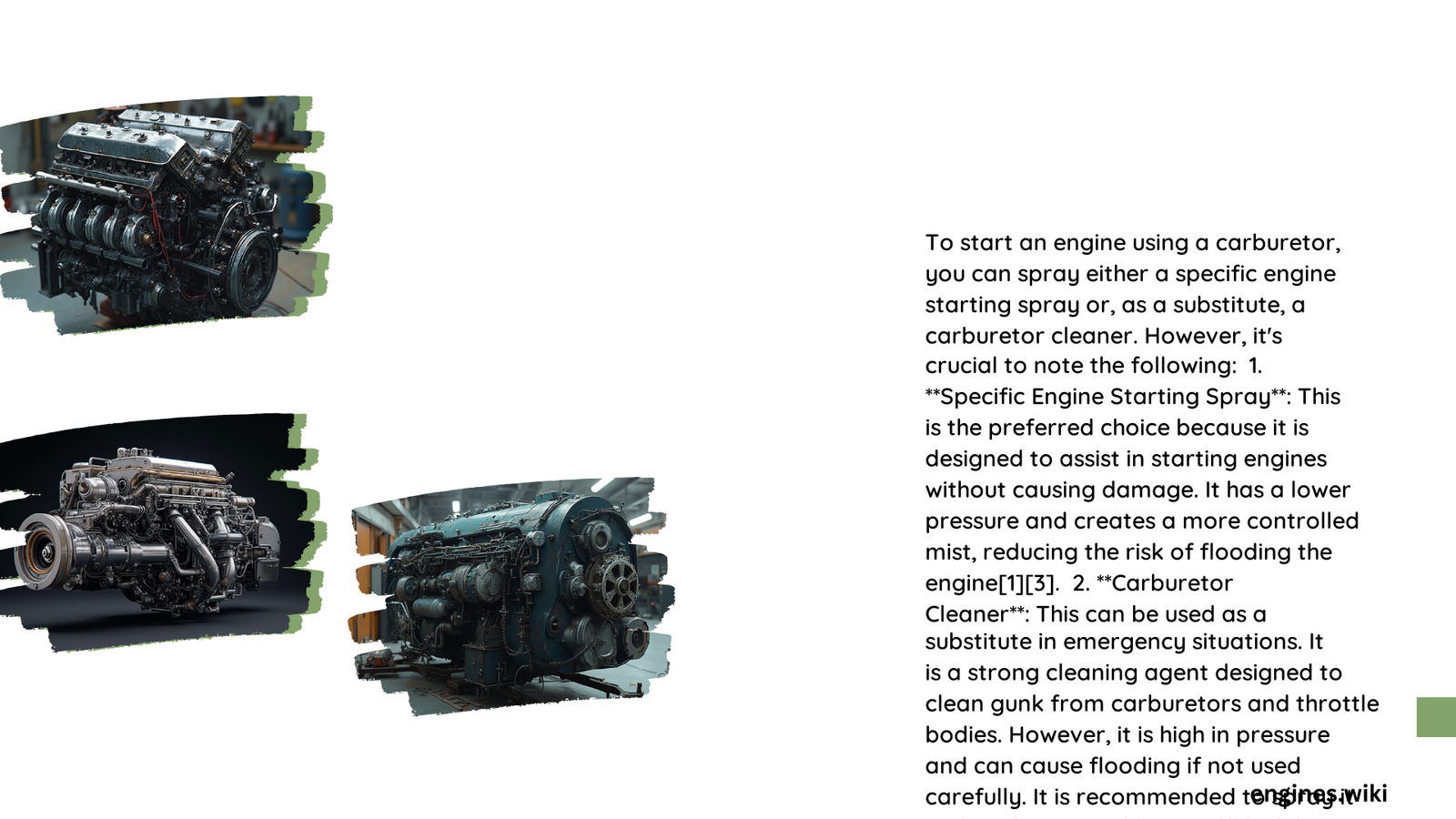When your engine refuses to start, knowing what to spray in the carb to start the engine can be a lifesaver. This guide explores various starting fluids, their applications, and best practices for using them effectively. We’ll cover products like CRC Jump Start, Lucas Oil Sure Start, and Gumout Starting Fluid, detailing their specific uses and benefits for different engine types.
What Are the Best Starting Fluids for Carbureted Engines?
Starting fluids are specially formulated products designed to help start engines in challenging conditions. Here are some of the top options:
- CRC Jump Start® Starting Fluid with Lubricity
- Lucas Oil Sure Start Premium Starting Fluid
- Gumout Starting Fluid
Let’s dive into the details of each product.
How Does CRC Jump Start® Work?

CRC Jump Start® Starting Fluid with Lubricity is a popular choice for starting stubborn engines. Here’s what you need to know:
- Application: Spray into the air intake system (air cleaner, carburetor, or intake manifold) while the engine is off.
- Quantity: Use one or two short sprays initially.
- Effectiveness: Works in temperatures as low as -65°F (-54°C).
- Engine Compatibility: Suitable for both gasoline and diesel engines.
- Additional Benefits: Contains upper cylinder lubricant to minimize engine wear during cold starts.
What Makes Lucas Oil Sure Start Premium Effective?
Lucas Oil Sure Start Premium Starting Fluid is another excellent option. Here are its key features:
- Application: Spray directly into the carburetor, air cleaner, or air intake.
- Engine Types: Works with passenger cars, diesel engines, lawn mowers, chainsaws, and outboard motors.
- Temperature Range: Effective down to -54°C (-65°F).
- Composition: Contains a 50% Ether blend and upper cylinder lubricant.
- Compliance: Meets federal low sulfur content requirements for diesel vehicles and non-road engines.
Why Choose Gumout Starting Fluid?
Gumout Starting Fluid offers its own set of advantages:
- Application: Spray directly into the carburetor, air cleaner, or air intake for a few seconds.
- Engine Types: Designed for gasoline engines only.
- Weather Conditions: Effective in extreme cold or humid weather.
- Additional Benefits: Lubricates upper cylinders and inhibits corrosion.
How to Properly Use Starting Fluid?
To get the best results when using starting fluid:
- Locate the air intake system (air cleaner, carburetor, or intake manifold).
- Ensure the engine is off.
- Hold the can upright and spray for 1-2 seconds.
- Attempt to start the engine.
- If necessary, repeat the process, spraying while cranking the engine.
What Precautions Should Be Taken When Using Starting Fluid?
While starting fluids can be incredibly helpful, it’s crucial to use them safely:
- Diesel Engines: Avoid using starting fluid in diesel vehicles with glow plugs to prevent engine damage.
- Two-Stroke Engines: Not recommended for regular use in two-stroke engines due to lack of lubricating qualities.
- Overuse: Don’t spray excessively, as it can wash away oil from cylinder walls.
- Fire Hazard: Keep away from open flames or sparks, as starting fluid is highly flammable.
What Are the Alternatives to Commercial Starting Fluids?
If you don’t have commercial starting fluid on hand, consider these alternatives:
- WD-40: Can be sprayed into the carburetor in small amounts.
- Brake Cleaner: Acts similarly to starting fluid but should be used sparingly.
- Carburetor Cleaner: Can help start the engine and clean the carb simultaneously.
Remember, these alternatives should be used cautiously and as a last resort.
How Does Engine Type Affect Starting Fluid Choice?
Different engine types may require specific considerations:
| Engine Type | Recommended Starting Fluid | Special Considerations |
|---|---|---|
| Gasoline | Any commercial starting fluid | Safe for most applications |
| Diesel | Ether-based fluids | Avoid use with glow plugs |
| Two-Stroke | Not recommended | Can lead to engine damage |
| Lawn Mower | Low-ether content fluids | Use sparingly |
| Outboard Motor | Marine-specific starting fluid | Corrosion-resistant formulas |
What Are the Long-Term Effects of Using Starting Fluid?
While starting fluid can be a quick fix, frequent use may lead to:
- Increased wear on engine components
- Potential damage to seals and gaskets
- Reduced overall engine lifespan
It’s best to address underlying starting issues rather than relying on starting fluid as a long-term solution.
How Can You Prevent the Need for Starting Fluid?
To minimize the need for starting fluid:
- Perform regular engine maintenance
- Use fuel stabilizers in stored vehicles
- Keep batteries charged and in good condition
- Address any carburetor issues promptly
- Store vehicles in a dry, temperate environment when possible
By following these preventive measures, you can reduce the frequency of hard starts and the need for starting fluid.
Remember, while starting fluid can be a useful tool, it’s not a cure-all for engine problems. If you find yourself frequently relying on starting fluid, it’s time to have your engine checked by a professional mechanic.
References:
1. CRC® Jump Start® Starting Fluid with Lubricity, 11 Wt Oz
2. Sure Start Premium Starting Fluid | Lucas Oil Products
3. Starting Fluid – Gumout
